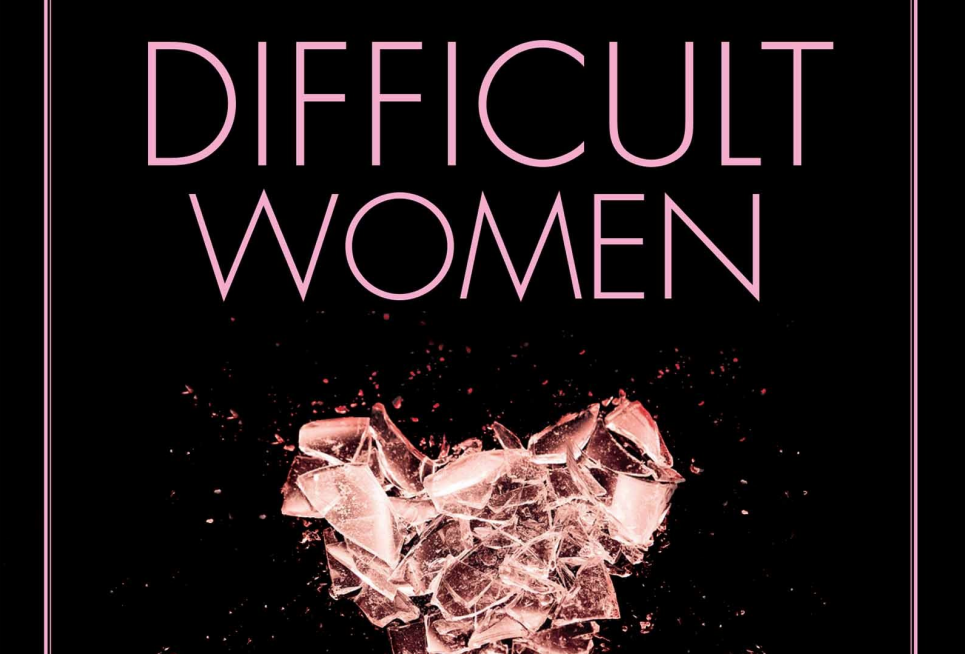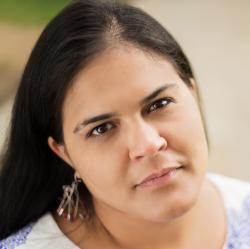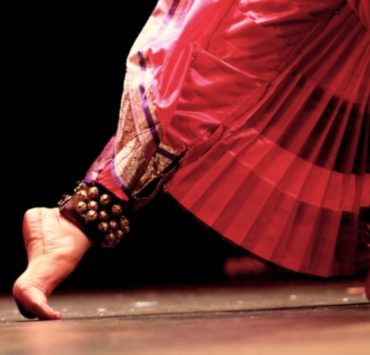
When I was sixteen years old, the National Hispanic Institute nominated me to attend a week-long, national summit on youth smoking prevention. When I arrived, an organizer told me that of the 100 youth picked nationally, I was the only Latina. She said, “We needed someone with your voice.”
My three friends that week were the black girl from Brooklyn, Tara, and two self-professed nerds from Nebraska. We sang Red Hot Chili Peppers on the shuttle and laughed at one of the Nebraskans’ impressions of Bill Clinton. We bonded over the same pop culture references and novels. When I told Tara about the organizer’s comments, she said, “We’re just here because they need some color.”
I argued with Tara that it wasn’t true. That I’d been picked for being smart and having a background in debate. That I was more than a token spokesperson for Latino youth. She looked at me sadly and smiled.
“Sure. But you’ll see.”
I was too young, and too unwoke, to understand what she meant until years later.
My first year of graduate school, a well-meaning white woman said to me, “I’m so happy you’re here. Voices like yours are necessary.”
“Necessary” is a complicated word. In the writing workshop I was criticized for writing about college binge-drinking, without adding information on addiction in the Latino community (instead of focusing on, I don’t know, binge-drinking in college-aged humans). Anytime I wrote something like, “my father keeps his shoes on in his house,” people in workshop translated that to “this is a common Latino custom.”
No matter how much I struggled to say, “I’m not just a brown woman,” it appeared that larger cultural forces kept pushing me to define myself as such.
![]()
At the end of January 2017, a luncheon took place in Park City, Utah to celebrate women in film, as a part of the Sundance Festival. At this lunch, actress Salma Hayek pointed out that more women should be employed in government so female voices can be heard. From the LA Times:
“But be careful that we don’t fall into victimization,” Hayek added. “I don’t want to be hired because I’m a girl. I want them to see I’m fabulous. Don’t give me a job because I’m a girl. It’s condescending.”
After Hayek’s comments, a conversation ensued. Hayek’s ideas that she is more than “a girl” resonated with actress Shirley MacLaine, who pointed toward a “core identity” that is separate from being a woman. Actress Jessica Williams didn’t really agree with the assessment.
Williams: My question is: What if you are a person of color, or a transgendered person who — just from how you look — you already are in a conflict?
MacLaine: Right, but change your point of view…Change your point of view of being victimized. I’m saying: Find the democracy inside.
Hayek (to Williams): I’m sorry. Can I ask you a question? Who are you when you’re not black and you’re not a woman? Who are you and what have you got to give?
Williams: A lot. But some days, I’m just black, and I’m just a woman… Like, it’s not my choice. I know who I am. I know I’m Jessica, and I’m the hottest bitch on the planet I know.
Hayek: No, no, no… Take the time to investigate. That’s the trap! …There is so much more.
MacLaine: Right. The more is inside.
![]()
Privilege is a fucker.
A few years ago, I took a quiz online that analyzed my writing, determining gender, age, and education level from language choices and syntax. My results indicated that I was a middle-aged white man with at least some graduate schooling.
The assessment is not that far off, despite my lack of middle-aged white maleness. My education, literary background, and stylistic choices do not reflect my vagina as much as they do my intellectual interests and a desire to be syntactically complex.
I am more than just a Latina woman. I’m also someone who grew up in a solidly upper middle-class household. I’m oddly fastidious about the arrangement of spaces I occupy on a regular basis. I love my dogs and husband, not always in that order. I’m a bath and cycling enthusiast who doesn’t do enough of either. I think about the opera (and Oprah!) and have read more romantic novels than I care to admit. I benefit from cis-privilege, financial privilege, education privilege, geographic privilege, able-bodied privilege, heteronormative privilege, and passing as a heterosexual.
Compared to some people, I’m a middle-aged white man with some graduate schooling.
But that’s not entirely true. Because no matter how much wealth or privilege I come from, there will always be someone who will use my Latina body against me, whose eyes will shine from the assumptions contained in my skin. Sometimes, I change my posture when confronted with that kind of stare. I try to counter any assumptions with a smile. But some days, I don’t care and play into the stereotype, flashing my hardest “What?!” face to friend and foe alike.
To quote Jessica Williams, just from how I look, I am already in conflict.
![]()
Williams: I think what you’re saying is valid, but I also think that what you’re saying doesn’t apply to all women. I think that’s impossible.
Hayek: What part of it is impossible? You’re giving attention to how the other one feels.
Williams: Because I have to.
Hayek: If you have to do that, then do that. Then that’s your journey. But I want to inspire other people to know it’s a choice.”
Williams: I also feel like the word ‘victim’ — I feel like it has bothered me. When I talk about feminism, sometimes I feel like being a black woman is cast aside. I always feel like I’m warring with my womanhood and wanting the world to be better, and with my blackness — which is the opposite of whiteness.
….
Williams: I think we need to not speak over black women, not assign them labels.
Hayek: What does this mean, ‘speak over?’
Williams: To project your ideas on me. I think there is a fear that if we present an idea that, ‘Hey, maybe [black women] have it a little bit harder in this country’ — because we do; black women and trans women do — if we’re having it a little bit harder, it doesn’t invalidate your experience. I really am begging you to not take it personally.
![]()
I recently read Roxane Gay’s Difficult Women. The book is purposefully uncomfortable. A good discomfort. The kind of discomfort that binds your heart. A restrictive squeeze in my chest. The tightness of being unable to do anything for the fictional (how can I rescue her characters?) in the face of life’s big and little tragedies. I could not help but wrap my own arms around myself as I read, reassuring my body that we’d get through each haunting story, a hug that indicated resilience. Which is to say, I felt Roxane Gay’s prose in my body.
In the stories, the women are difficult, make difficult decisions, have difficult things happen to them, and survive with difficulty.
When I finished the book, I closed my eyes and tried to recollect every time I’ve been called “difficult.” I thought of the things that have happened to me–the ones I had no say in—from the color of my skin to the boy who chose to hurt me.
Discomfort is characterized by unease. By definition, discomfort is not meant to feel natural or easy. To be in discomfort is to be in pain, to be anxious, to be tender, to be vulnerable, to be out of place, to be confused, to be uncertain, to be displaced—all within your own body.
Discomfort brings about change.
Discomfort with oppression leads to revolution. Physical and emotional discomfort lead to therapy, the slow process of acknowledging and changing that which makes you uncomfortable.
When we seek happiness and wealth, we call it being comfortable, having comfort.
To be made other is to feel uncomfortable. A synonym for discomfort is “foreign” is “ache” is “trouble.” It is the difficult that brings discomfort.
It’s hard not to take discomfort personally.
![]()
Hayek: Baby, I’m Mexican and Arab. I’m from another generation, baby, when this was not even a possibility. My generation, they said, ‘Go back to Mexico. You’ll never be anything other than a maid in this country.’ By the heads of studios! There was no movement. Latino women were not even anywhere near where you guys are. I was the first one. I’m 50 years old. So I understand.
Williams (shaking her head quietly): You don’t understand.
![]()
Historically, most Latina actresses have portrayed maids, prostitutes, and Carmen Miranda hip-shakers. There are parallels to the struggles black actresses have faced, no doubt. Hayek is right when she says she’s one of the first mainstream Mexican actresses in the U.S. She is, even as she follows paths paved by fellow Latinas Rita Moreno, Mercedes Ruehl, and Chita Rivera.
In the days following the lunch at Sundance, outlets reported on Hayek and Williams’ exchange. Many noted Hayek’s comment “there was no movement,” as a tone deaf comment on the Civil Rights movement. But I think Hayek is referring to an ideological movement here. She’s commenting on the failures of intersectionality.
I’m not interested in oppression olympics here. Comparing the struggles of Latinos and black people in the U.S. serves no purpose, other than to signal variations on oppression at the hands of the same source.
Yet, generally respected websites, took this on as oppression olympics all the way (in some cases going so far to claim that a Latina woman is not indigenous, which seems a bit off base to me). On social media, a debate ensued about whether or not Salma Hayek is really Latina. If her wealthy childhood and billionaire husband make her brownness mute. As if she hasn’t faced discrimination. As if wealth in any way insulates from hate. As if the comfort of her lifestyle negates this country’s discomfort with her skin.
One cannot agree with Williams’ point and deny that Hayek is a woman of color or invalidate her experience.
As writer Jennifer Howard pointed out, what we have on our hands is a difference of philosophy. Hayek is speaking from a ideological/spiritual perspective while Williams engages a materialist argument. To put it simply: Hayek and MacLaine seem to believe that the spirit/self is separate from the body while Williams points toward a body defined by the material/physical realities of its existence. So, am I an individual spirit who happens to also be Latina, or am I a person defined by the various cultural signifiers that shaped my sense of reality?
What the reading public has on its hands, thanks to the LA Times, is an uncensored and difficult discussion by women with vastly different philosophical points of view. This is not a catfight. This is a discussion about power, identity, and the complex narratives that every woman of color brings to the table. This is about confirming the idea that a “woman of color” is anything but simple.
Hayek is wrong here. She cut Williams off. She used condescending language (“baby”). And she forced Williams to look her in the eye (a trait I find to be very Mexican). Her Instagram apology did not really seem like an apology at all. A person who said “stop being a victim,” seems to be, well, playing the victim. There is plenty that cannot be defended here. But she cannot be dismissed entirely.
![]()
From Salma Hayek’s Instagram:
I am so sorry that I did not respond earlier to the feelings and valid concerns many of you have expressed in the last few days about a story that was published this weekend by the Los Angeles Times. I had not checked my phone through the weekend and only saw the article last night. I am deeply disturbed by the way this story has misrepresented me and manipulated my words in printing them out of context. We all believed we were in a forum to brainstorm about ways in which women in the industry could thrive and that was my heart’s intention. I have always and will always support the empowerment and the voices of black women and women of color. It is inaccurate that I did not let Jessica express herself, she very passionately and eloquently spoke her mind and I listened and engaged in what she was saying. In fact I was very disappointed that the conversation was cut short and not able to continue. I am devastated that something that left me feeling inspired and empowered has since been depicted as a cat fight, and worse yet painted in this way by a female journalist. Rest assured, I will right this wrong…
![]()
Roxane Gay delivered a keynote address at the Winter Institute about diversity just as the Hayek/Williams/MacLaine conversation escalated in public and social media.
In it she writes:
“I am a black bisexual woman. I am Haitian American. I am a Libra. I grew up middle-class and then upper middle class. I am fat. My identity is political because so much of who I am is part of the public discourse, subject to legislation, subject to discrimination and disadvantage. Clearly, this is not the entirety of my life and who I am. Don’t get me wrong—I’ve got it pretty good. In fact, the work I do, it isn’t for me, really. It’s for the people who don’t have the privileges I do, who need someone to stand and speak and fight for them, with them. I am trying, with my writing and activism, to offer sanctuary.”
Gay seems to be pointing toward Williams’ argument here. Identities are political–but she offers a bit of the ideologue as well (“this is not the entirely of my life and who I am”). Perhaps there is a mild compromise to be had here, but one that is aware. This, I believe, is where Hayek fails. She fails to listen, to imagine, what Williams is trying to say. She refuses to be uncomfortable.
More Roxane Gay:
“Language matters and sometimes, like the word diversity, it becomes an empty container for whatever people want to fill it with. Go high. Trump hate. Be nasty. Wear a pantsuit. I don’t begrudge people finding comfort or solidarity in these words and ideas, but goddamn. We needed to do better then and we need to do better now. We need to get uncomfortable and that means moving beyond tidy words that make us feel like the world is a better, more unified and inclusive place than it is.”
In Difficult Women, Gay embraces this discomfort. Her work asks to be read slowly. To be parceled out—for a thoughtfulness that is generally missing from our rhetoric.
A book of short stories about women who refuse definition may not seem to have a lot to do with a Hollywood lunch in Utah, but underneath it all is the inherent difficulty of trying to understand complicated women. Of trying to hear one another. Of holding ourselves, even as the binding pain of discomfort lingers, long after you’ve closed the last page or walked away from the conversation.
Image Credits: Difficult Women

Ramírez won the inaugural PEN/Fusion Emerging Writers Prize in 2015 for her nonfiction novella, “Dead Boys” (available as a Kindle single from Little A). A nonfiction writer, storyteller, digital maker, critic and performance poet based in Pittsburgh, she is working on her first full-length book, “The Violence” (forthcoming from Scribner).







